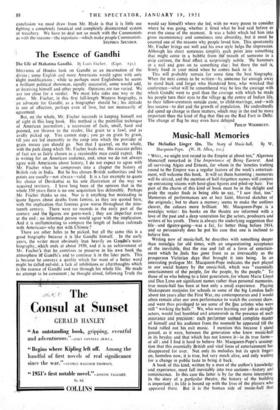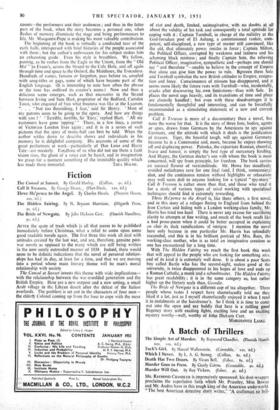Music-hall Memories
The Melodies Linger On. The Story of Music-hall. By W.
" WELL, we might trot round. to the Empire at about ten," Algernon Moncrieff remarked in The Importance of Being Earnest. And all surviving Algies and Ernests, for whom in the 'nineties trotting round to the Empire was a regular feature of the week's entertain- ment, will welcome this book. It will set them humming ; memories will be stirred, and the mention of half-forgotten names will conjure up entrancing visions with hour-glass figures and piled-up hair. ' For part of the charm of this kind of book must be in the delight and pride the reader finds in being able to say, " I saw that, too." Memories of performances are at best faint, blurred sketches of the originals ; but to share a memory seems to make the outlines clearer, the colours more brilliant. Mr. Macqueen-Pope is a nostalgic writer: his books on the theatre are informed with a love of the past and a deep veneration for.lhe actors, producers and writers of his youth. There is always the underlying suggestion that life—and keatre-going—was a far, far better thing before 1914, and so persuasively does he put his case that one is inclined to believe him.
Writing now of music-hall, he describes with something deeper than nostalgia for old times, with an unquestioning acceptance of the inevitable, that the rise and fall of a form of entertain- ment which he feels has gone from us as irrevocably as the prosperous Victorian days that brought it into being. In an interesting prologue Mr. Macqueeh-Pope indicates the part played in our social history by the music-hall, which was "essentially entertainment of the people, for the people, by the people." To those of us who belong to a later generation, for whom Marie Lloyd and Dan Leno are significant names rather than personal memories, true music-hall has been at best only a small experience. Playing Shakespeare matinees for schools in some of the big London halls about ten years after the First War, my contemporaries and I would often remain after our own performance to watch the current show, and were thus privileged to see some of the #ne artistes who were still " working the halls." We, who were learning our job as straight actors, would feel humbled and amateurish in the presence of such assurance and precision : each per former seeMed complete master of himself and his audience from the moment he appeared till the band rolled out his exit music. I mention this because I stand poised, as it were, between the generation who knew music-hall in its heyday and that which has not known it—in its true form- at all ; and I find it hard to believe Mr. Macqueen-Pope's assump- tion that this essentially British and vital form of entertainment has disappeared for ever. Not only its melodies but its spirit lingers on, homeless now, it is true, but very much alive, and only waiting for a change in public taste to bring it back. A book of this kind, written by a man of the author's knowledge and experience, must fall inevitably into two sections—history and reminiscence. In this case the latter is by far the more interesting. In the story of a particular theatre. the history of the building is important ; its life is bound up with the lives of the players who appeared there. But it is the human side of music-hall that
counts—the performers and their audiences ; and thus in the latter part of the book, when the story becomes a personal one, when flashes of memory illuminate the stage and bring performances to life, Mr. Macqueen-Pope is making his most valuable contribution.
The beginning of the book is virtually a conducted tour of the early halls, interspersed with brief histories of the people associated with them ; but the author's enthusiasm for his subject makes him an exhausting guide. Even his style is breathless. We follow, panting, as he rushes from the Eagle to the Union, from the " Old Mo' " to Evans's, across the Strand to the Cole Hole, and off again through time and space to the Oxford, the Middlesex, the Trocadero. Hundreds of names, famous or forgotten, pass before us, coupled with song-titles or gags, some of which have become part of the English language. (It is interesting to note how often the phrase or the tune has outlived its creator's name.) Now and then a delicious scene emerges, such as that encounter in the Strand between Irving and Sam Hart, proprietor of the Bedford, Camden Town, who enquired of him what business was like at the Lyceum. . . ' Not too flourishing, I fear,' said Sir Henry. Most of my patrons seem to be going to the opera. And how are things with you ? ' " Terrible, terrible, Sir 'Enry,' replied Hart. All my customers have gone 'opping.' " There, in a few lines, a corner of Victorian London lives again ; and it is in a series of such pictures that the story of music-hall can best be told. When the author settles doim to describe shows and individuals in his memory he is delightful company. His accounts of some of the great performers at work—particularly of Dan Leno and Harry Tate—arc masterly. Forothose of us who did not see them a faint vision rises, the ghost of a voice can be heard, and in imagination we grasp for a moment something of the inimitable quality which



































 Previous page
Previous page